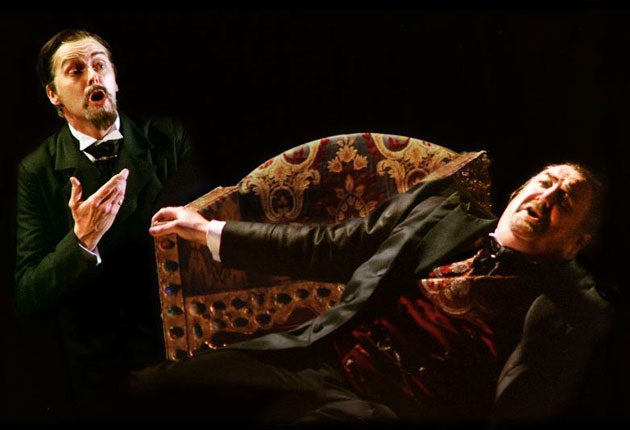Boris Godunov, Coliseum, London<br/>Berezovsky/Kniazev/Makhtin, IndigO2, London<br/>Kozená/Martineau, Barbican Hall, London
Only a tentative Tsar undermines ENO's arresting new production of Mussorgky's searing opera

Making a fetish of authenticity is a modern phen-omenon. Much as period instruments have acquired the status of a luxury accessory, the words "original version" have achieved a cachet that most composers, beleaguered by the well-intentioned advice or harsh criticism of their contemporaries, would have found inconceivable.
Revised in 1871 and 1872, reorchestrated first in dazzling colour by Rimsky-Korsakov, then in violent daubs of red and black by Shostakovich, the 1869 version of Boris Godunov has hitherto bucked this trend: too spare, too angular, too unconventional. Yet, as director Tim Albery and conductor Edward Gardner reveal in English National Opera's new staging, Mussorgsky's original has a potency that later versions dilute.
Careless as it may be of audience comfort (there is no interval), the decision to play Boris Godunov in the style of an epic symphonic poem is musically persuasive. Under Gardner, the orchestral sound is an intense concentrate of grey and gold, aching bassoons and bare strings, gross brass and deafening bells: a heavy Russian forebear of Bartok's cooler soundworld. The severity of texture and plainness of expression is mirrored on stage, where Adam Silverman's lighting shrouds a stark, wooden shed in semi-permanent dusk. Though Brigitte Reiffenstuel's handsome costumes place us on the cusp of revolution, the unsettled angle of Tobias Hoheisel's set and the carpet of what appears to be charred bone fragments look forward to Stalin's terror regime. Warmed feebly by votive candles, turned to gold for the coronation, or thrown into drab relief by the fur and fine fabrics that separate the Tsar, his children and the Boyars from the cynical, starving masses, this is the Russia of rifle-butts and repression.
If you can have a magnificent Boris Godunov without a magnificent Boris, this is it. Albery's economy of movement, Gardner's highly disciplined yet savage conducting, Hoheisel, Silverman and Reiffenstuel's eloquent designs, the powerful chorus, poignant Simpleton (Robert Murray), Xenia (Sophie Bevan) and Fyodor (Anna Grevelius), and warmly sung Innkeeper (Yvonne Howard) and Varlaam (Jonathan Veira) are not to be sniffed at. Gregory Turay (Dmitry), James Gower (Priest) and David Stephenson (Shchelkalov) give well-observed support, and though John Graham-Hall's Shuisky smacks of Weimar cabaret, this is a well integrated, thorough and serious production.
Unfortunately, Peter Rose's Boris is too cuddly to convince: a Bill Bailey figure of hapless affability, not an ambitious ruler defeated by his own guilt. Too tender a voice and self-effacing an actor to convey the Tsar's ambivalence and insanity, Rose is comprehensively outsung by Brindley Sherratt's incisive, commanding Pimen.
Another day, another Boris. Curious to discover how the building formerly known as the Millennium Dome is working as a classical music venue, I went to see pianist Boris Berezovsky, cellist Alexander Kniazev and violinist Dmitri Makhtin play Mendelssohn, Schubert, Dvorák and Rachmaninov at Indig02: the 1,700 seat venue that promises seating of multiplex-style luxury and "never seen before [sic] close-up footage of the techniques of some of the greatest musicians in the world".
Alas, the "minute and unobtrusive state-of-the-art cameras" were off on Tuesday. As were Mendelssohn and Schubert. And about 1,500 of the potential punters. But given how hastily Dvorák's F minor Piano Trio (Opus 65) appeared to have been prepared – no eye-contact, insecure tempi, fluffed entries – this was probably a good thing. That Berezovsky's score kept closing of its own accord, indicating that its spine hadn't been broken, did not inspire confidence. Technical facility is one thing, but what about interpretation, character, depth?
His performance of Rachmaninov's Trio Elégaïque No 2 in D minor was, by contrast, sensitively argued and beguilingly voiced, and Makhtin's delicate, old-fashioned timbre and Kniazev's big-boned, 1970s sound blended immaculately in the metreless simplicity of the second movement. Still, I was shocked that musicians of their stature would risk such a shambolic first half and only agree on how many repeats they would do in the second half during the performance itself. Indig02 is patently not the Wigmore Hall, but its patrons deserve better than to watch "the greatest musicians in the world" apparently sight-reading.
Magdalena Kozená's Barbican recital, by contrast, seemed over-prepared. Drawn from her latest recording, Songs My Mother Taught Me, this intimate programme of Czech songs included cycles by the Rorem-esque Petr Eben and the criminally under-performed Martinu and Schulhoff. Kozena's voice remains pure and pretty but her expressive range has narrowed and she was often startlingly unengaged with the narrative. But Malcolm Martineau's playing sparkled with intelligence throughout the burnished patina of Dvorák's Mne zdálo se, zes umrela and the deceptively simple rhythmic flutters of Janácek's Silesian Songs.
'Boris Godunov' (0871-911 0200) to 1 Dec
Subscribe to Independent Premium to bookmark this article
Want to bookmark your favourite articles and stories to read or reference later? Start your Independent Premium subscription today.

Join our commenting forum
Join thought-provoking conversations, follow other Independent readers and see their replies